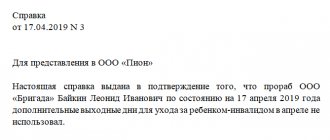Peculiarities of employment of disabled people in the Russian Federation
The rights of people with disabilities are regulated at the federal level. The labor activity of any citizen of the Russian Federation, including disabled people, is protected and provided with due rights. In particular, regulatory documents on the protection of the rights of persons with disabilities are:
- The Constitution of the Russian Federation, which establishes the right of every Russian citizen to work and to protect their rights.
- Labor legislation (Labor Code of the Russian Federation), which regulates the labor requirements of persons with disabilities.
- Federal Law No. 181 dated November 24, 2995 “On social protection of disabled people in the Russian Federation.”
- Hygienic requirements for the working conditions of citizens with disabilities, established by the Order of the Chief Sanitary Doctor of the Russian Federation dated May 19, 2009.
Based on Art. 13 Federal Law No. 1032/1 as amended on 03/07/2018. “On rural employment in the Russian Federation”, the state provides people with disabilities with additional guarantees for employment, assists in finding a job, develops and implements targeted programs to provide work for people with disabilities, and also fixes some quotas for hiring this category of employees.
For example, for enterprises that employ more than 100 people, the legislator sets a quota for hiring disabled people for positions in the amount of 2-4% of the total number of subordinates. For those organizations with 25 to 100 employees, the state provides a quota of no more than 3% for hiring disabled people.
When calculating the average number of employees, subordinates who work in harmful and dangerous conditions are not taken into account.
Also, upon employment, a citizen undergoes an MSA (medical and sanitary examination), which:
- determines the degree of disability, disability group, causes and conditions for its acquisition;
- determines the working conditions that will be within the power of a particular subject due to his or her health status;
- monitors compliance with its regulations by employers who employ disabled people;
- assist in restoring the health of the category of employees in question, that is, they draw up individual rehabilitation programs.
The ITU conclusion on working conditions for people with disabilities is a necessary document for an employer when hiring a person with increased needs.
Tax benefits
Disabled people since childhood and disabled people I and II are provided with a monthly standard tax deduction for personal income tax in the amount of 500 rubles. regardless of the amount of the employee’s annual income (paragraph 7, paragraph 2, paragraph 1, article 218 of the Tax Code of the Russian Federation), provided that the disabled person receives income subject to personal income tax at a rate of 13%.
You can obtain additional information about tax deductions for personal income tax on the website of the Federal Tax Service - https://www.nalog.ru/rn77/fl/interest/tax_deduction/.
You can also receive a social tax deduction for personal income tax in the amount of expenses for medical services and medicines (clause 3, clause 1, article 219 of the Tax Code of the Russian Federation). Again, provided that during the tax period (year) you had income subject to personal income tax at a rate of 13% (for example, salary). Medical services for which a deduction can be claimed are listed in Decree of the Government of the Russian Federation dated March 19, 2001 No. 201. This resolution provides two lists of medical services:
- a list of medical services in medical institutions of the Russian Federation provided to the taxpayer, his spouse, his parents and (or) his children under the age of 18, the amount of payment for which at the expense of the taxpayer’s own funds is taken into account when determining the amount of social tax deduction;
- a list of expensive types of treatment in medical institutions of the Russian Federation, the amounts of expenses actually incurred by the taxpayer are taken into account when determining the amount of social tax deduction.
At the same time, the amount of deduction for medical services from the first list is limited, the limit value is set in Art. 219 of the Tax Code of the Russian Federation. And the costs of expensive treatment are taken into account in the amount of social deduction for personal income tax without any limitation on the amount.
The list of medications for the costs of which you can receive a social deduction is established by Decree of the Government of the Russian Federation dated March 19, 2001 No. 201.
A social deduction for personal income tax is provided in the amount of expenses actually incurred, but cannot exceed 120,000 ₽ in combination with other social deductions (for the education of the taxpayer (his brothers (sisters)); medical services, medicines and insurance premiums under DLS agreements; non-state pension provision, voluntary pension insurance and voluntary life insurance; additional insurance contributions for funded pension).
Let us remind you that for expensive treatment the amount of social deduction is not limited (paragraph 4, paragraph 3, paragraph 1, article 219 of the Tax Code of the Russian Federation).
Exempt from paying property tax for individuals
(Clause 1 of Article 407 of the Tax Code of the Russian Federation) disabled people of groups I and II, disabled since childhood.
The tax base for land tax is reduced by a tax-free amount of RUB 10,000. per taxpayer in the territory of one municipality (federal cities of Moscow, St. Petersburg and Sevastopol) in relation to a land plot owned, permanent (perpetual) use or lifetime inheritable possession by the following categories of taxpayers (clause 5 of Article 391 of the Tax Code RF):
- disabled people of groups I and II;
- disabled since childhood.
Clause 2 of Article 333.38 of the Tax Code of the Russian Federation provides for 50 percent exemption from payment of state fees
Basic requirements of legislation on labor protection for disabled people
It is the responsibility of the employer of a disabled person to provide the latter with appropriate working conditions.
Premises for such work must comply with established hygiene standards. So, a disabled person should be completely safe. Also, working conditions must comply with the rehabilitation program established by the medical officer. In particular, based on the provisions from clause 4 to clause 15 of the Hygienic Requirements, the office should not be located on the ground floor or in the basement. The building in which the office is located should not contain more than two floors. The space itself should not be cluttered with anything, nothing should hinder the movement of the subject. It is also necessary to eliminate the risk of slipping on the floor.
Based on clause 5 of the Hygienic Standards, the following requirements are also set for the workroom:
- the rest room for disabled people must have an area of at least 12 square meters, with a minimum of 0.3 square meters per employed disabled person;
- The work area should be regularly wet cleaned.
In addition, labor legislation contains some restrictions on the working hours of disabled people. In particular, Art. 92 of the Labor Code of the Russian Federation states that the working week for citizens with increased needs, having 1st and 2nd disability groups, should not be more than 35 hours. Moreover, if the attending physician of a particular employee has decided that the work week should be shorter, the employer must also take this into account.
An employer does not have the right to force disabled people to work overtime, as well as to work on holidays and weekends, unless there is written consent from the subordinate. Moreover, if an employee agrees to such activity, but a medical opinion states otherwise, work under the specified conditions becomes impossible.
Social protection of disabled people
Be sure to read the Federal Law of November 24, 1995 No. 181-FZ “On the social protection of disabled people in the Russian Federation.” Link to the legal system where you can familiarize yourself with the legislation – https://www.consultant.ru/online/. Below are excerpts from this law.
Disabled people and families with disabled children in need of improved housing conditions are registered and provided with living quarters in the manner prescribed by the legislation of the Russian Federation and the legislation of the constituent entities of the Russian Federation. Providing, at the expense of federal budget funds, housing for disabled people and families with disabled children in need of improved housing conditions, registered before January 1, 2005, is carried out in accordance with the provisions of Article 28.2 of the Federal Law of November 24, 1995 No. 181-FZ.
Disabled people and families with disabled children in need of improved housing conditions, registered after January 1, 2005, are provided with living quarters in accordance with the housing legislation of the Russian Federation.
Material support for disabled people includes monetary payments on various grounds (pensions, benefits, insurance payments for insuring the risk of health impairment, payments for compensation for harm caused to health, and other payments), compensation in cases established by the legislation of the Russian Federation.
The monthly cash payment is set in the amount of:
- disabled people of group I – 2,162 rubles;
- disabled people of group II, disabled children – 1,544 rubles;
- disabled people of group III – 1,236 rubles.
If a citizen simultaneously has the right to a monthly cash payment under the Federal Law of November 24, 1995 No. 181-FZ and under another federal law or other regulatory legal act, regardless of the basis on which it is established, he is provided with one monthly cash payment either under the Federal Law dated November 24, 1995 No. 181-FZ, or according to another federal law or other regulatory legal act at the choice of a citizen.
Disabled people and families with disabled children are provided with compensation for the cost of living quarters and utilities in the amount of 50 percent :
- rental fees and fees for the maintenance of residential premises, including fees for services, work on managing an apartment building, for the maintenance and ongoing repairs of common property in an apartment building, based on the occupied total area of residential premises of state and municipal housing funds;
- payments for cold water, hot water, electrical energy, thermal energy consumed during the maintenance of common property in an apartment building, as well as for the disposal of waste water for the purpose of maintaining common property in an apartment building, regardless of the type of housing stock;
- payment for utilities, calculated based on the volume of consumed utilities, determined by meter readings, but not more than consumption standards approved in the manner established by the legislation of the Russian Federation. In the absence of the specified metering devices, fees for utility services are calculated based on standards for the consumption of utility services, approved in accordance with the procedure established by the legislation of the Russian Federation;
- payment for the cost of fuel purchased within the limits established for sale to the public, and transport services for the delivery of this fuel - when living in houses that do not have central heating.
Disabled people of groups I and II, disabled children, citizens with disabled children are provided with compensation for the costs of paying a contribution for major repairs of common property in an apartment building, but not more than 50 percent of the specified contribution , calculated based on the minimum amount of the contribution for major repairs for one square meter of total living space per month, established by a regulatory legal act of a constituent entity of the Russian Federation, and the size of the regional standard for the standard living space used to calculate subsidies for living space and utilities.
Disabled people and families that include disabled people are given the right to priority receipt of land plots for individual housing construction, farming and gardening.
Contraindications to work for persons with disabilities
Labor legislation prohibits the employment of disabled people in harmful and dangerous conditions. Such activities are contrary to medical indications for the subject. It is assumed that the manager is responsible for the health of a subordinate with disabilities.
Specifically, the prohibited physical conditions are:
- the presence of strong noise, inappropriate room temperature (very high or too low), the presence of drafty rooms;
- presence of electromagnetic fields;
- insufficient lighting of the work area.
Chemical contraindications include:
- the presence of a high level of dust;
- high level of gas indoors or at an industrial facility;
Biological labor contraindications are as follows:
- the presence of infected microorganisms in the activity;
- contact with viruses.
The following dynamic and static loads on the body of a disabled person are also prohibited:
- working with weights;
- long or fast walking, the need to run;
- incorrect body position in relation to the medical indications of the subject in the labor process.
Nervous contraindications include:
- monotonous, unvaried work;
- the presence of the possibility of a nervous breakdown (for example, due to corresponding relationships in the team);
- work on night shifts.
Answers to common questions about how labor protection for disabled people is carried out
Question #1:
How to hire a disabled person of group 2 and at the same time comply with all labor protection requirements?
Answer:
Disabled people of the second group, upon employment, submit to the employer an individual rehabilitation program, which specifies all the necessary working conditions and restrictions. The document indicates what work a disabled person can do, what industries a person can work in, and what conditions to provide in the workplace.
Question #2:
Is it difficult to organize a workplace for a group 3 disabled person so that labor protection for disabled people is ensured?
Answer:
No, organizing working conditions for disabled people of group 3 is not difficult and does not require large financial investments, since this disability group is considered working. However, if a citizen transfers an individual rehabilitation program to the employer, the employer must comply with the requirements of the document so that the employee’s health does not deteriorate.
Labor protection of disabled people in the Russian Federation of certain categories
Disability is classified according to the organ or body part affected. Thus, a disability associated with the visual system manifests itself in a complete or partial absence of vision. Such subjects should not perform work duties in noise or in conditions where there are strong vibrations. At the same time, excellent lighting in the work area is extremely important for visually impaired workers. The presence of glasses is also a necessary attribute of the work of a visually impaired employee. This makes it possible not to deteriorate your vision at work.
One of the special categories of disabled people are those with neuropsychiatric diagnoses. Such a subject must also undergo treatment at a neurological clinic before being allowed to work. The working conditions stipulate:
- a minimum number of walls and partitions, with the exception of staircases. In such areas, it is necessary to install additional partitions if the enterprise is expected to employ people with mental illness;
- if there is glazing in the room, the glass must be made of unbreakable material;
- It is also important to maintain optimal temperature and cleanliness, in particular, there should be no chemicals.
Patients with tuberculosis are considered one of the categories of disabled people. For this group of employees, in addition to the necessary specially equipped premises, appropriate enterprises are also required. In particular, working conditions must strictly comply with the following rules:
- The work area should not contain any hazard that would complicate the light work of employees. The specified complications can be caused by the presence of allergens or metals in the air. Any violations related to air pollution for tuberculosis patients are a serious illegal action of the manager, which may even entail criminal liability;
- availability of satisfactory temperature in the office or workshop. Changes in humidity and air temperature can lead to serious complications in the course of the illness of such workers;
- All work areas for tuberculosis patients should be located on the sunny side of the building. This is due to the fact that sunlight minimizes the likelihood of dampness spreading throughout the offices;
- During the lunch break, such patients should be given separate dishes and cutlery, which should then be disinfected according to the appropriate rules.
A separate disability group is also considered complete or partial lack of hearing. At the same time, restrictions for deaf workers are minimal, since all body functions, in addition to auditory ones, operate satisfactorily.
However, the existing limitations are related to the following:
- the work of a deaf or hard of hearing person is prohibited in rooms with increased noise levels;
- It is also prohibited to work in industries that actively use flammable substances.
Special working conditions are also required for subjects who have serious diseases of the cardiovascular system. The main aspects of the work of such employees are:
- The work area should not contain high levels of vibration. It also implies high-quality noise insulation;
- it is recommended to locate offices for such employees on the non-sunny side of the production building;
- offices should be arranged so that bending and stress on the body of subjects is minimal.
Personnel portal
The specifics of regulating the work of disabled people are established by the Labor Code of the Russian Federation, as well as Federal Law No. 181-FZ of November 24, 1995 “On the social protection of disabled people in the Russian Federation” (hereinafter referred to as Law No. 181-FZ). All benefits and guarantees provided to disabled people depend on the disability group and the degree of disability.
A disabled person is considered to be a person who has a health disorder with a persistent disorder of body functions, caused by diseases, consequences of injuries or defects, leading to limitation of life activity and causing the need for his social protection (part one of Article 1 of Law No. 181-FZ). Recognition of a citizen as a disabled person is carried out during a medical and social examination in the manner established by Chapter II of Law N 181-FZ and Decree of the Government of the Russian Federation dated February 20, 2006 N 95 “On the procedure and conditions for recognizing a person as disabled” (hereinafter referred to as the Procedure). The disability group is assigned in accordance with the Classifications and criteria approved by order of the Ministry of Health and Social Development of the Russian Federation dated December 23, 2009 N 1013n.
According to clause 36 of the Procedure, a citizen recognized as disabled is issued a certificate confirming the fact of disability, indicating the disability group, as well as an individual rehabilitation program (hereinafter referred to as IPR), which, by virtue of Art. 224 Labor Code of the Russian Federation and Art. 11 of Law N 181-FZ, is mandatory for execution by an organization, regardless of its legal form and form of ownership. A disabled person has the right to refuse to implement the IRP, both in part and in whole. In this case, according to part seven of Art. 11 of Law N 181-FZ, the organization is exempt from responsibility for the implementation of the IPR of a disabled employee, and a disabled person loses the right to receive compensation in the amount of the cost of rehabilitation measures provided free of charge.
Part two art. 23 of Law N 181-FZ establishes a general requirement according to which collective or labor agreements are not allowed to establish working conditions for disabled people that worsen their situation compared to other employees. This applies to the terms of remuneration, working hours and rest periods, the duration of annual and additional paid leave and other working conditions.
The legislation does not provide for reduced working hours for group III disabled people; the normal working time for them is 40 hours a week (part two of article 91 of the Labor Code of the Russian Federation). For a disabled person of group I or II, a reduced working time of no more than 35 hours per week should be established while maintaining full wages (part one of article 92 of the Labor Code of the Russian Federation, part three of article 23 of Law N 181-FZ).
Based on the provisions of Art. 11, art. 23 of Law N 181-FZ and Art. 93, art. 94, art. 224 of the Labor Code of the Russian Federation, if the length of working time of a disabled person is specified in the IPR or medical report and it is less than that specified in the Labor Code of the Russian Federation, the employer must establish such an employee a part-time working day (shift) or a part-time working week within the limits specified in the IPR, medical report. In this case, the employee’s work is paid in proportion to the time worked or depending on the amount of work performed (part two of Article 93 of the Labor Code of the Russian Federation). Part-time work does not entail for the employee any restrictions on the duration of the annual basic paid leave, calculation of length of service and other labor rights (part three of Article 93 of the Labor Code of the Russian Federation).
Based on Art. 96, art. 99, art. 113 of the Labor Code of the Russian Federation, disabled people of any group can be involved in work at night, overtime, as well as on weekends and non-working holidays only with their written consent and provided that such work is not prohibited for them for health reasons in accordance with a medical report. Employees must be informed in writing of the right to refuse such work.
Also, disabled people of any group are granted annual leave of at least 30 calendar days (Article 23 of Law No. 181-FZ). In accordance with Art. 128 of the Labor Code of the Russian Federation, the employer is obliged to provide disabled workers, on the basis of a written application from the employee, leave without pay for family reasons and other valid reasons for up to 60 calendar days a year.
Disabled people of the Great Patriotic War and disabled people of combat operations in defense of the Fatherland have a preferential right to remain at work when the number or staff of employees is reduced (part two of Article 179 of the Labor Code of the Russian Federation).
Expert of the Legal Consulting Service GARANT Mazukhina Anna
Source: audit-it.ru
Criminal law. Concept, goals, types of punishment. Criminal record. Amnesty. Pardon
Labor protection of disabled people of groups 2 and 3 in the Russian Federation
For a long time, it was believed that the third group of disabled people does not have any special limitations and is able to carry out their work duties almost on the same level as employees who do not have disabilities. Modern legislation supports the tendency for people with this disability group to work. Thus, it is assumed that a subject with the third group can work in almost any production field. However, when hiring, there is no need for special recommendations or medical reports. An employer can hire a person with a similar problem without further action.
With the second disability group, things are more complicated. In the presence of such a problem, it becomes difficult for citizens to find work. Employers, in turn, are skeptical about such employees and are reluctant to hire them.
Legally, it is assumed that personnel officers at an enterprise must pay special attention to the individual medical indications of subjects. Thus, the attending physician’s conclusion may contain a list of positions that will not harm the subject’s health, as well as detailed working conditions for a particular disabled person. At the same time, the MSEC structure also has the right to issue a person with a referral to work in a specific organization.
A few words about recognizing a person as disabled.
Currently, recognition of a person as a disabled person is carried out by the federal institution of medical and social examination in accordance with the Procedure and conditions for recognizing a citizen as a disabled person, established by Decree of the Government of the Russian Federation of February 20, 2006 No. 95 (hereinafter referred to as Procedure No. 95). By virtue of clause 9 of Order No. 95, disability is established:
- for group I – for two years;
- for groups II and III – for a year.
At the same time, according to clause 12 of Order No. 95, disability is established until the 1st day of the month following the month for which the next medical and social examination of the citizen (re-examination) is scheduled. In accordance with paragraph 36 of Order No. 95, a citizen recognized as disabled is issued a certificate confirming the fact of disability, indicating the disability group, as well as an individual rehabilitation program.
For your information:
The form of the certificate is approved by Order of the Ministry of Health and Social Development of the Russian Federation dated November 24, 2010 No. 1031n, and the form of the individual rehabilitation program is approved by Order of the Ministry of Health and Social Development of the Russian Federation dated August 4, 2008 No. 379n.
For a citizen who has a document on temporary disability and is recognized as disabled, the disability group and the date of its establishment are indicated in a certificate issued by a medical and social examination institution (clause 37 of Procedure No. 95). Having received a medical and social examination certificate from the employee, the employer must check the correctness of its execution, in particular, the presence of all the necessary data.










